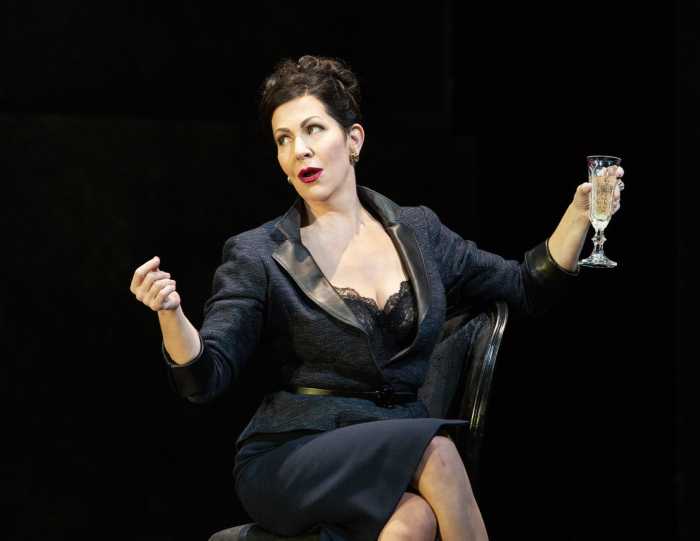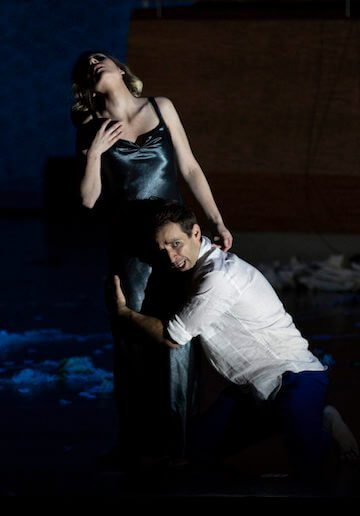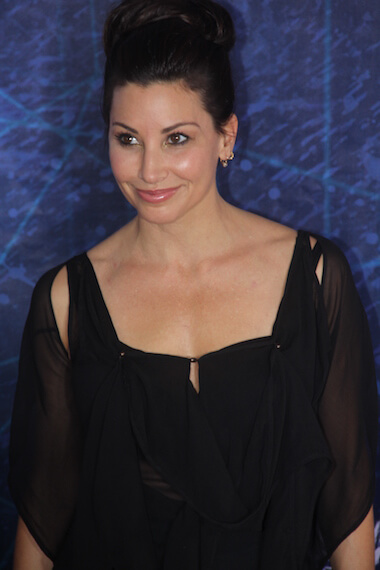Sam Crane and Mark Rylance in Claire van Kampen’s “Farinelli and the King,” directed by John Dove , at the Belasco Theatre through March 25. | JOAN MARCUS
A stunning dual highlight of the 2013 theater season was “Richard III” and “Twelfth Night” in repertory, imported from London’s Shakespeare’s Globe Theatre and starring the wily virtuoso Mark Rylance.
Aside from the spot-on performances, what made those works so exquisite was the obsessive attention to historical detail, with sumptuous period-perfect costumes, bearded musicians playing Baroque instruments, and a stage lit almost exclusively by candlelight. Select theatergoers even got to sit in a gallery onstage, much like they did in the Globe Theatre back in the day.
If you wish to recapture the magic, hie thee over to the Belasco Theatre where Claire van Kampen’s new play “Farinelli and the King” has taken residence for a strictly limited engagement. Director John Dove has repeated those authentic touches to enhance van Kampen’s atmospheric drama (the playwright, by the way, happens to be Rylance’s wife).
Rylance shines as a crazed king soothed by the healing powers of music
But there’s an added treat. In this retelling of Philippe V, the notorious maniacal king of Spain, and the efforts to cure his manic-depression with the aid of famous castrato Carlo “Farinelli” Broschi, the play features haunting Handel arias sung in Italian by countertenor Iestyn Davies (the vocals are so taxing that James Hall covers select performances). It should be noted that Sam Crane, the actor who plays Farinelli, does not sing; Davies stands beside him, “Avenue Q” style.
The triumph of “Farinelli and the King” is showcasing the distinct pleasures of these magnificent vocalizations, transporting theatergoers back in time. As mesmerizing as it is magical, it’s easy to see how Farinelli drove adoring crowds wild — the way, say, Tom Jones did in the 1960s or Harry Styles does today.
The shaky plot, as it happens, would seem contrived if it weren’t true. Set mainly in the Madrid palace circa 1737, Philippe’s behavior has become so erratic — staying awake through the night, fishing out of goldfish bowls, talking to clocks — that he no longer can govern, and his chief minister, La Cuadra, schemes to have him dethroned. But when his wife Isabella brings the beautiful, angel-voiced Farinelli to court to perform a kind of music therapy, Philippe is entranced and indeed becomes stabilized.
For his part, the young maestro is grateful to be of service and to leave behind the pressures of being a slave to his rabid fans. He never performed in public again.
Iestyn Davies and Sam Crane. | JOAN MARCUS
Although the big draw is triple Tony-winner Rylance, who renders Philippe’s abrupt mood shifts utterly convincing, the rest of the cast is equally fine. As the great yet tragic Farinelli, the highly appealing Crane expresses a superstar’s self-assurance while avoiding narcissism. We admire his fortitude — Farinelli long ago accepted that his brother castrated him at age 10 to make money. Or has he?
Melody Grove’s Isabella radiates an inner core of strength as she is torn between love of her husband and duty to their subjects. Edward Peel is extraordinary as La Cuadra. His near-comical, exaggerated facial expressions are so telling that his dialogue is almost superfluous.
Rounding out the cast are Huss Garbiya as the royal physician, Colin Hurley as the opportunistic theater manager, and Lucas Hall in other supporting roles.
Nearly as remarkable as the historical details is Isabella’s progressive stance on treating mental illness. Most experts at the time believed afflicted people were mad or possessed and treated them with exorcism or bloodletting or imprisonment. The good queen knew that Farinelli, with his unearthly vocal range of nearly three octaves and his ability to hold a note for two-and-one-half minutes, might cure the king. Modern clinical studies have proven that certain music releases mood-lifting chemicals like dopamine and endorphins within the brain.
In fact, Handel has often been compared to the mythological Orpheus in his ability to profoundly move audiences with music. Surely van Kampen had the well-known quote from the period in mind, “Music hath charms to soothe a savage breast.”
FARINELLI AND THE KING | Shakespeare’s Globe | Belasco Theatre, 111 W. 44th St. | Through Mar. 25: Tue. at 7 p.m.; Wed.-Sat. at 8 p.m.; Wed., Sat. at 2 p.m.; Sun. at 3 p.m. | $32-$169 at Telecharge.com or 212-239-6200 | Two hrs., 10 mins., with intermission




































